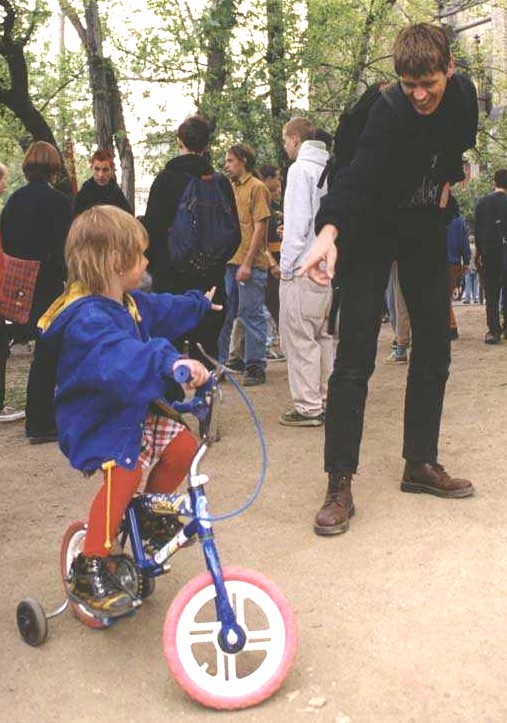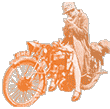 |
Home birth
[ 16.4.2001, Jan Haverkamp
Rodičovství > Porodnictví
]
In Literarny noviny, a leading Czech national weekly, there was a fierce discussion last month on the issue of home birth. Having had the Czech and the Dutch experience of how my partners gave birth to wonderful children, this discussion did not draw my attention for the first time. My son - in the Netherlands - was almost born at home. My daughter was in a hurry, and because she already wanted to come out after 7 months of pregnancy, she was born in a hospital - in the Czech Republic. This latter experience confronted me for the first time in my life with a structural treat of Czech social organisation: In the Czech hospital we were "not on your own responsibility, but under the responsibility of the State." Two short stories.
My son took his time. He had played football already in the days before his birth and twisted his navel string (umbilical cord) around his neck. His mother had a very heavy time. After 23 hours of labour, the midwife decided that we needed to go to hospital. While running through a thunderstorm to her car, she remarked: "This is real midwife weather - a good sign". Another hour later my son, Thijs, was born - put preventively in an "aquarium" (as the nurse called it), and three hours after his birth, his mother and i went down and held him in our arms.
Home birth is in the Netherlands the rule. There is a traditionally strong network of midwifes and home doctors, and a very intensive preparation scheme for future mothers and fathers. Mothers are prepared for everything that is going to happen by the midwife of their choice, and mostly will follow (insurance covered) preparation courses. Partners (male or female) are invited regularly to join - not only in the informative talks, also to train what to do during the birth, and to participate in the preparation gymnastics. Nothing philosophical about it - it is just that many Dutch men and women like to be near to their partner in all this. They feel that the birth is also an important part of their life. And i thoroughly enjoyed listening to the pregnant mother gossip and enjoy in the future father / co-mother preparations.
When the first contractions set in, i was - as father - had learned to help them turning them into positive events. We were at home (of course) and everything had its natural place. Over the following 23 hours, the midwife visited regularly with increasing frequency. To answer questions, see how things were going. When things drew out, she explained us carefully what could be the case, and on hour 23 took the logical conclusion: to the hospital - a 15 minute drive, and everything stood ready for us. There, Thijs was born with the help of the midwife - and mine as partner. The supervising gynaecologist came to have a look if everything went all right, did a few essential checks and discussed with the midwife the right procedures. Everything was perfect for having the perfect feeling of comfort. We had our role, the doctor his and the midwife hers and all were happy with it.
My daughter was in a hurry. She loves her mother, but also loves to play outside. She first thought that seven months would be enough for her, but mother, father and doctor thought differently about that. A standard diet of hormones and all kind of other medicins were used to convince little Bara to stay inside a little longer. After i left the Sokolov hospital for a few days to the Netherlands (nothing indicated that the moment was approaching) she decided that now was long enough. I had to return with the first possibility - to Plzen, where Adela, her mother, was transfered to in a hurry, because Sokolov was not prepared for such risky births. Arrived in Plzen, thinking i would be far too late (more than 24 hours after i had received the telephone call), i was "comforted" with the remark that it would still take at least a day. The next morning - after a strong stand of Adela - i was allowed to be with her when she was brought to the birth room. Contractions were started up with hormones and the gynaecologist and nurse went back to their offices. "This will still take some time. Warn us, when the contractions are coming every 10 minutes or so". Well... that was already the case after 30 minutes, and when i told the doctor that i thought birth might happen any moment now, she irritatedly remarked that i should not panic. She was the more surprised to find out i was right and there was already over 9 cm. opening.
After Bara was born, her mother could keep her in her arms for a few seconds. Then the small girl was transported to another hospital, because this hospital did not have the means to care for such an early born lady. Two days later, her mother already leapt over two beds to watch the first snow of the year falling. We asked the doctor whether it would be possible to have her visit her daughter in the other hospital. "No", the doctor said. And we said, that we thought that tomorrow Adela would be strong enough and we could arrange a taxi from door to door. And then the above mentioned quote was made: "Maybe in the Netherlands things are different, but here you are... not on your own responsibility, but under the responsibility of the State." Nobody mentioned that Adela was to be released in two days anyway. She remained back with the horrible feeling that she was not allowed to see her daughter - a feeling of terror on the responsibility of... the State? No, of a mechanically working doctor and her director. In defense of some of the Czech health system i need to add that the hospital where Bara had been brought to - the Plzen academic hospital - was excellent, modern and open.
The remarks of a well known gynaecologist in Literarny noviny were for me shocking. Very shortly summarised: home births were too risky, and the Czech hospital system had proven to be the best solution. The wish of women to give birth at home was only a fashionous abberation that would put their children to risk. I think that the Dutch experience suffiently proves that women with thousands of reasons to have their children at home have a point to make. As a father, i felt a lot more secure in the flexibly organised Dutch surroundings than in the mechanically planned Czech one. Even though i was supposed to do a lot more in the Netherlands during the birth, i felt a lot more safe doing it, than in the Czech hospital where i was allowed to be present under protest of the staff , and certainly could not be taken fully seriously...
| Jan Haverkamp is of Dutch origin and immigrated into the
Czech Republic in 1997. He worked as organizational development specialist
for Central and Eastern European environmental organizations and is
currently Greenpeace anti-nuclear campaigner for Central Europe. He lives with
his partner and daughter in Cvrcovice
near Kladno and has a son in the Netherlands. |
 |
Názory
z druhé strany - Thought from the other side
In
this weekly column, pro-feminist men - men that are strongly influenced
by the feminist movement - write their observations in daily life on the
role of men and women in the Czech Republic.
|





